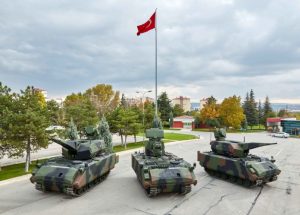
Share this article on social media
The impressive development of the Turkish defense industry has been a significant topic of discussion in recent years. With strong government support and investment, key players and companies have been driving technological advancements and fostering international collaboration and partnerships. This has not only led to economic growth but also presented new challenges and future opportunities. The industry’s military capabilities and innovations continue to make a substantial impact, showcasing the remarkable evolution that has taken place.
The Evolution of the Turkish Defense Industry
The development of the Turkish defense industry has been a remarkable journey, marked by significant advancements and strategic initiatives. Over the years, the industry has undergone a transformative evolution, positioning Turkey as a key player in the global defense arena.
Strategic Vision: The development of the Turkish defense industry can be attributed to the government’s unwavering support and strategic vision. Through robust investment and policy frameworks, the government has fostered an environment conducive to innovation and growth.
Indigenous Production: A pivotal aspect of the industry’s evolution has been the emphasis on indigenous production capabilities. Turkish defense companies have made substantial strides in producing advanced defense systems, reducing dependency on foreign suppliers, and enhancing self-reliance.
Technology and Research: Technological advancements have played a crucial role in propelling the industry forward. The focus on research and development has led to the creation of cutting-edge technologies and capabilities, bolstering the overall competitiveness of the Turkish defense sector.
Global Recognition: The development of the Turkish defense industry has garnered global recognition, with Turkish defense products gaining traction in international markets. This has not only boosted the country’s export potential but has also elevated its status as a reliable supplier of defense equipment.
The continuous development of the Turkish defense industry underscores Turkey’s commitment to strengthening its national security and contributing to the global defense landscape. This evolution sets the stage for further advancements and collaborations, solidifying Turkey’s position as a prominent player in the defense industry.
Government Support and Investment
The development of the Turkish defense industry has been significantly influenced by substantial government support and investment. Through strategic initiatives, the Turkish government has actively fostered the growth and innovation of the defense sector. Here are some key points highlighting the government’s role in supporting and investing in the Turkish defense industry:
Financial Backing: The government has allocated substantial financial resources to support research, development, and production within the defense industry. This funding has facilitated the advancement of cutting-edge technologies and the modernization of defense capabilities.
Incentive Programs: Various incentive programs, such as tax incentives and grants, have been instituted to encourage private sector involvement in defense-related projects. These programs aim to stimulate investment in research and development, as well as the production of defense equipment and technologies.
Regulatory Support: The government has implemented favorable regulations and policies to create a conducive environment for defense industry growth. This includes streamlining approval processes for defense projects and providing regulatory frameworks that facilitate collaboration between domestic and foreign entities.
Strategic Partnerships: The government has actively pursued international collaborations and partnerships to bolster the capabilities and expertise of the Turkish defense industry. These partnerships have allowed for knowledge sharing, technology transfer, and joint ventures, contributing to the industry’s advancement.
The proactive involvement of the government through support and investment has been instrumental in driving the development of the Turkish defense industry, positioning it as a prominent player in the global defense market.
Key Players and Companies
The development of the Turkish defense industry has been strongly influenced by key players and companies that have played a pivotal role in driving progress and innovation in this sector. Some of the most prominent entities include:
ASELSAN: This leading Turkish defense company specializes in military communication systems, radar and electronic warfare systems, electro-optical systems, and defense and missile systems. Its substantial contributions to the industry have significantly enhanced Turkey’s defense capabilities.
TAI (Turkish Aerospace Industries): TAI has been instrumental in advancing Turkey’s aerospace and defense sectors. The company is renowned for producing a diverse range of products, including aircraft, satellites, and helicopters.
Roketsan: Focused on missile systems and ammunition, Roketsan has been a key player in the development of missile technology, rocket systems, and space systems for Turkey’s defense industry.
Havelsan: Specializing in software-intensive solutions, Havelsan has been a key contributor to the development of command control systems, live-virtual-constructive training technologies, and simulation systems for military and civilian applications.
BMC (Turkish Commercial Vehicles Corporation): BMC’s expertise in manufacturing military vehicles, tactical wheeled vehicles, and commercial vehicles has significantly bolstered Turkey’s defense industry.
These key players not only demonstrate the remarkable development of the Turkish defense industry, but also exemplify the capabilities and expertise that have positioned Turkey as a significant player in the global defense arena.
In order to provide a clearer understanding of their contributions, let’s take a look at a comparison table showcasing key attributes of these influential companies:
| Company | Specialization | Notable Products |
|---|---|---|
| ASELSAN | Military communication systems | Radar systems, defense and missile systems |
| TAI | Aerospace | Aircraft, satellites, helicopters |
| Roketsan | Missile systems and ammunition | Missile technology, rocket systems |
| Havelsan | Software solutions | Command control systems, training tech |
| BMC | Vehicle manufacturing | Military and commercial vehicles |
The remarkable progress achieved by these key players and companies underscores the development of the Turkish defense industry as one that is marked by innovation and advanced technological capabilities.
This growth is a testament to Turkey’s commitment to advancing its defense capabilities and establishing itself as a prominent global player in the defense industry.
Technological Advancements
The development of the Turkish defense industry has been marked by significant technological advancements, demonstrating the nation’s commitment to innovation and progress. The integration of cutting-edge technologies has enabled the Turkish defense industry to bolster its capabilities and enhance its global standing. Some notable technological advancements in the industry include:
Unmanned Aerial Vehicles (UAVs): Turkey has made remarkable strides in the development and production of UAVs, with platforms like the Bayraktar TB2 gaining international recognition for their efficiency and effectiveness in modern warfare scenarios. The utilization of UAVs has greatly contributed to the military capabilities of the Turkish armed forces.
Missile Systems: The development of advanced missile systems has been a focal point of the Turkish defense industry. With the production of indigenous missile systems such as the Roketsan UMTAS and HISAR, Turkey has showcased its technological prowess and self-reliance in meeting the defense needs of the country.
Electronic Warfare: The integration of sophisticated electronic warfare systems has further strengthened Turkey’s defense capabilities. The focus on electronic warfare technologies demonstrates the industry’s adaptability to modern warfare dynamics and its emphasis on staying ahead in the technological arms race.
In comparison to other global defense industries, the development of the Turkish defense industry in terms of technological advancements has positioned the country as a formidable player in the international defense arena. The industry’s focus on innovation and the successful deployment of advanced technologies set a solid foundation for sustained growth and influence.
International Collaboration and Partnerships
The development of the Turkish defense industry has been significantly influenced by international collaboration and partnerships. By joining forces with global players in the defense sector, Turkey has been able to leverage expertise, technology, and resources to advance its defense capabilities. Here’s an overview of the international collaboration and partnerships shaping the Turkish defense industry:
Strategic Alliances: Turkey has forged strategic partnerships with countries like the United States, Germany, and the United Kingdom to enhance its defense capabilities. These alliances have facilitated technology transfer, training programs, and joint research and development initiatives, contributing to the overall development of the Turkish defense industry.
Joint Ventures: Collaboration with international defense companies through joint ventures has been instrumental in fostering technology exchange and expertise enhancement. These ventures have paved the way for the localization of defense production, leading to the growth of indigenous capabilities in Turkey.
Participation in International Programs: Turkey’s involvement in international defense programs such as the F-35 Joint Strike Fighter program has not only provided access to cutting-edge technology but has also positioned Turkey as a key contributor to the global defense supply chain.
Export Partnerships: Collaborative efforts with international partners have opened doors for Turkish defense companies to access new markets and export their products globally, thereby fueling the growth of the Turkish defense industry.
In summary, international collaboration and partnerships have played a vital role in the development of the Turkish defense industry, enabling knowledge transfer, technology acquisition, and market expansion, ultimately strengthening Turkey’s position in the global defense arena.
Economic Impact and Growth
The development of the Turkish defense industry has not only strengthened the country’s national security but has also significantly impacted its economy. Let’s delve into the economic landscape shaped by this industry:
Job Creation: The growth of the defense industry has led to a surge in job opportunities, providing employment to a substantial number of skilled workers and professionals. This has contributed to the overall reduction of unemployment rates.
Boost to Local Economy: With increased government spending and investments in defense, there has been a significant boost to the local economy. This includes the growth of ancillary industries that support defense manufacturing and technology development.
Export Potential: The evolution of the Turkish defense industry has positioned the country as a notable exporter of defense equipment and technology. This has not only expanded the country’s export market but has also contributed to a favorable balance of trade.
Investment Magnet: The industry’s growth has attracted both domestic and foreign investments, fostering innovation and technological advancements. This influx of investments has further propelled the industry’s expansion and competitive edge in the global market.
GDP Contribution: The development of the defense industry has made substantial contributions to Turkey’s Gross Domestic Product (GDP), playing a pivotal role in the overall economic growth and stability.
Despite these economic benefits, challenges such as global market competition and geopolitical dynamics continue to influence the development of the Turkish defense industry. However, the industry’s resilience and potential for continuous growth make it a significant player in shaping Turkey’s economic landscape.
Challenges and Future Opportunities
The development of the Turkish defense industry has not been without its share of challenges, but it also presents a plethora of future opportunities. Let’s delve into the key aspects:
Challenges:
- Technological Gap: One of the primary challenges facing the Turkish defense industry is the technological gap with leading global manufacturers. Bridging this gap requires substantial investment in research and development.
- Export Restrictions: The industry also faces challenges related to export restrictions, particularly with regards to sourcing critical components and gaining market access in certain regions.
- Cybersecurity Threats: With the increasing reliance on technology, cybersecurity threats pose a significant challenge to the defense industry’s overall stability and reliability.
Future Opportunities:
- Investment in R&D: The focus on research and development presents significant opportunities for the industry to enhance indigenous capabilities and address the technological gap.
- Global Collaborations: Collaborating with international partners can facilitate knowledge transfer and technology sharing, thereby boosting the industry’s innovation capabilities.
- Diversification of Products: The industry has the opportunity to diversify its product range to cater to emerging market needs, such as unmanned aerial vehicles, naval systems, and cybersecurity solutions.
In considering these challenges and opportunities, it’s evident that the development of the Turkish defense industry holds the potential for remarkable growth and advancement. Embracing these opportunities and effectively mitigating challenges will be instrumental in shaping the industry’s future trajectory.
Military Capabilities and Innovations
The development of the Turkish defense industry has fueled the enhancement of military capabilities and innovations. Through strategic investments and advancements, Turkey has significantly bolstered its defense capabilities on multiple fronts. Here’s a closer look at the military advancements:
State-of-the-Art Technology: The development of the Turkish defense industry has led to the integration of cutting-edge technology into military equipment and systems. This includes advanced surveillance and reconnaissance systems, unmanned aerial vehicles (UAVs), and sophisticated command and control systems.
Indigenous Weapons Production: With a focus on self-sufficiency, Turkey has ramped up the production of indigenous weapons and defense systems. This has led to the successful development of various weapons, including smart ammunition, aerial platforms, and naval vessels.
Cyber Warfare Capabilities: The development of the Turkish defense industry has seen a significant focus on strengthening cyber warfare capabilities. Investments in cybersecurity technologies have resulted in improved defense against cyber threats and attacks.
Military Innovations: Turkey has demonstrated a commitment to innovation in military technology, encompassing areas such as missile systems, electronic warfare capabilities, and advanced military aircraft. The country’s defense industry has increasingly focused on enhancing its military prowess through continuous innovation.
International Export of Defense Products: The development of the Turkish defense industry has not only enhanced its domestic capabilities but has also resulted in a surge in defense product exports. This expansion has further established Turkey as a significant player in the global defense market.
The evolution of military capabilities and innovations underscores the transformative impact of the ongoing development of the Turkish defense industry. As Turkey continues to prioritize technological advancements and indigenous production, its military capabilities are set to reach greater heights, positioning the nation as a formidable force in the global defense landscape.
Frequently Asked Questions
What is the current status of the Turkish defense industry?
The Turkish defense industry has experienced impressive growth and development in recent years. It has evolved to become more self-reliant and has achieved significant advancements in technology and innovation.
What are some key areas of focus for the Turkish defense industry?
The Turkish defense industry focuses on the development of advanced military technologies, cybersecurity, aerospace, naval systems, and land-based defense systems. It has also made significant progress in producing indigenous defense equipment and platforms.
How does the Turkish defense industry contribute to national security?
The Turkish defense industry plays a crucial role in enhancing national security by providing cutting-edge defense capabilities, strategic deterrence, and the ability to respond effectively to evolving security threats. It also supports the modernization and strengthening of the country’s defense forces.
What are some notable achievements of the Turkish defense industry?
The Turkish defense industry has achieved significant milestones in producing indigenous weapons, military vehicles, unmanned aerial vehicles (UAVs), and electronic warfare systems. It has also established successful partnerships and collaborations with international defense organizations.
What is the outlook for the future of the Turkish defense industry?
The future of the Turkish defense industry looks promising, with ongoing efforts to develop advanced defense technologies, expand export capabilities, and strengthen international collaborations. It is poised to become a key player in the global defense market.








